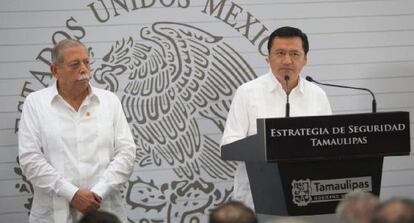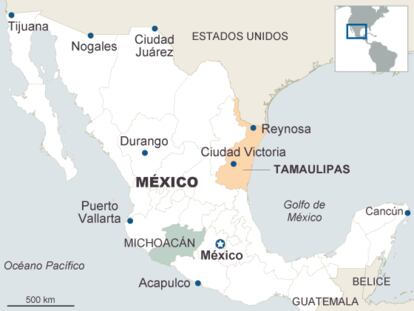Peña Nieto sends troops to Tamaulipas
Mexican president deploys army, navy and federal police to fight drug violence in border state

Mexican President Enrique Peña Nieto has decided to use military power to restore law and order in Tamaulipas. For years, the northeastern state has been experiencing a wave of drug-related violence and turf wars between various cartels. Hundreds of people have died. The escalating chaos seemed to threaten the federal government’s authority in the region. In order to halt the growing violence, Peña Nieto has ordered a large deployment to provide security for Tamaulipas’ three million residents.
According to Interior Minister Miguel Osorio Chong, the government will divide the state into four zones and put each under a special command team that will include military and navy personnel. This operation has three objectives: dismantle the criminal organizations with the aid of intelligence; cut off the roads used for human, drugs, weapons and money trafficking; and create a dependable security structure. The highways, which have been unnavigable for years after the cartels started blocking them, “will now be patrolled 24/7.” The government will also increase security at ports, airports and customs offices.
The operation includes disbanding more than 40 currently active police corps in Tamaulipas, due to the authorities’ fear the cartels have infiltrated them. This purge comes with the creation of a training center for new agents with “better salaries and benefits.” Minister Osorio Chong said the State Attorney General’s Office will also undergo “a complete purge.” The Mexican Attorney General will open four special regional offices to replace it.
According to Osorio Chong, the government will also intervene in the three states that share a border with Tamaulipas to avoid the “cockroach effect”: drug lords fleeing and taking refuge in other regions once the military has complete control of the state.

This intervention comes just as the situation is threatening to tarnish Peña Nieto’s accomplishments in the fight against drug trafficking. His 18-month presidency has seen the fall of legendary drug lords such as Joaquín “El Chapo” Guzmán and Miguel Ángel “Z-40” Treviño.
The narrative regarding this war has changed, having turned away from the lofty style of former president Felipe Calderón. This administration is investing ever more resources in intelligence services instead of using brute force. Still, Tamaulipas has made little progress.
Thirty percent of the foreign trade that comes into or leaves the country passes through the Tamaulipas-Texas border. The state is also an important corridor for drug and gun trafficking. It is no surprise that it was the birthplace of two of the most violent cartels in Mexico. The Zetas and the Gulf Cartel have been fighting over the highways in Tamaulipas for four years.
Kidnappings and extortion. Protection quotas to open a business or to sell merchandise. United Nations organizations hardly ever come to this area. The local press avoids reporting on crime and even the most powerful politicians, such as Rodolfo Torre Cantú find themselves in the line of fire. Cantú was the last Institutional Revolutionary Party (PRI) candidate for governor in Tamaulipas. He was shot and killed while driving down a highway during the electoral campaign.
Protests are rare in this environment. Only the brave would dare. Last Sunday, an unusual thing happened. About 4,000 people took to the streets to ask for an end to the reign of terror. Dressed in white and shouting “peace comes first,” the protestors defied the cartels.
This nascent citizen movement is another incentive for the military deployment. The federal government wants to avoid another uprising of self-defense groups, like in Michoacán. But, as some experts say, sending armed officers is not a cure-all. It has been done before. “The problem is the frailty of the regional institutions,” says Alejandro Hope, an expert on security. “There is security only when the federal government intervenes. The operations lead to a drop in crimes and drug lords move out. But, when peace returns, the federal agents leave and crime goes up. And, the cycle starts over.”
The task of the Mexican government is to break this vicious cycle. The operation has raised high hopes in Tamaulipas and in the rest of the country. Another battle – or maybe it is the same, constant battle – has begun.
Translation: Dyane Jean François
The police: an enemy to defeat
A few years ago a high-ranking military officer from the Vicente Fox (2000-2006) administration said that when the government strikes in a place like Sinaloa the criminals run to the mountainside and use it as a haven. But when the same thing happens in Tamaulipas, where there are few hills and mountains, criminals hide within the police forces.
In January 2010, Ubaldo Ayala Tinoco, a general who enjoyed a good reputation, was named Secretary of Security in Tamaulipas. Ayala Tinoco was one of the few Mexican officers who had studied at the Pentagon. Once he arrived in Tamaulipas, he found out that local police officers worked one day out of three. The mafias gave them 8,000 pesos (618 dollars) when they took a day off – the same amount the state offered them to work. Ayala tried to change the scheme to one work day followed by one rest day in exchange for a raise and better benefits. In return, the general received threats and he never found the support he needed from state authorities. He resigned after four months. When he returned to Mexico City, he told a security analyst that "Tamaulipas is a filthy wretch."
The police forces are still a headache for federal authorities. The newspaper “Milenio” reported on Monday that more than half of the members of Mexico’s 43 police corps failed their background checks. In March, 58 percent or 408 officers, did not pass the exam. Many of them had ties to the drug trade or used illegal substances.
Tu suscripción se está usando en otro dispositivo
¿Quieres añadir otro usuario a tu suscripción?
Si continúas leyendo en este dispositivo, no se podrá leer en el otro.
FlechaTu suscripción se está usando en otro dispositivo y solo puedes acceder a EL PAÍS desde un dispositivo a la vez.
Si quieres compartir tu cuenta, cambia tu suscripción a la modalidad Premium, así podrás añadir otro usuario. Cada uno accederá con su propia cuenta de email, lo que os permitirá personalizar vuestra experiencia en EL PAÍS.
¿Tienes una suscripción de empresa? Accede aquí para contratar más cuentas.
En el caso de no saber quién está usando tu cuenta, te recomendamos cambiar tu contraseña aquí.
Si decides continuar compartiendo tu cuenta, este mensaje se mostrará en tu dispositivo y en el de la otra persona que está usando tu cuenta de forma indefinida, afectando a tu experiencia de lectura. Puedes consultar aquí los términos y condiciones de la suscripción digital.








































